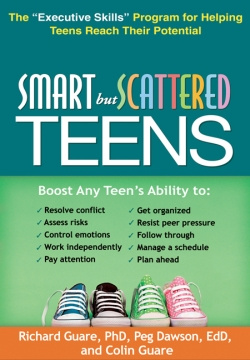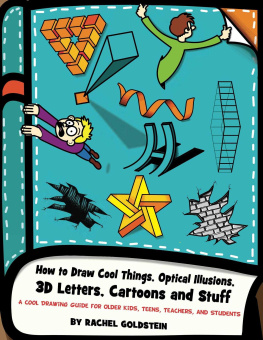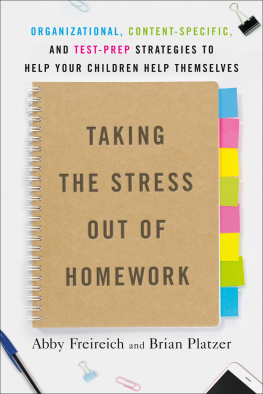Theres nothing more frustrating than watching a son or daughter who has so much to offer struggle with the typical tasks and functions of everyday life. The other kids in the class can write down the third-grade homework, remember to take the math book home, and then finish the assignment before bedtime. Why cant your daughter do that? When you sit with her, its clear she can do the math, and the teacher confirms that she understands the work. Most kindergartners can sit with the class at circle time for 10 minutes without causing major disruptions. How come your son, whos been reading since pre-K, cant stay there for more than 10 seconds? You have an 8-year-old who cleans his room with minimal fuss, but for your 12-year-old the chore sets off a weekly war. Your friends children dont forget permission slips, lose expensive coats, or fall apart in public. Why does yours?
You know your son or daughter has the brains and the heart to succeed. Yet teachers, your friends, maybe your own parents, and that nagging little voice in your head all say the child isnt where he or she should be. Youve tried everythingpleading, yelling, cajoling, bribing, explaining, maybe even threatening or punishing your child to get him to buckle down and do whats expected of him or muster up the self-control to act his age. Nothing has worked.
Thats because what your child may lack is skills. You cant talk children into using skills they dont have any more than the right incentive could get you safely down a black diamond run when you cant even ski the bunny hill. Your child may very well want and have the potential to do whats required but just doesnt know how. Scientists who study child development and the brain have discovered that most children who are smart but scattered simply lack certain habits of mind called executive skills. These are the fundamental brain-based skills required to execute tasks: getting organized, planning, initiating work, staying on task, controlling impulses, regulating emotions, being adaptable and resilientjust about everything a child needs to negotiate the typical demands of childhood in school, at home, and with friends. Some kids lack certain executive skills or lag behind in developing them.
Fortunately, theres a lot you can do to help. This book will show you how you can modify the daily experiences of a child aged 4 to 14 to build the executive skills that will make it possible for the child to get on track and get things done. The groundwork for the development of executive skills in the brain is laid before birth, and you cant control this biological capacity. But neuroscientists now know that these skills develop gradually and in a clear progression through the first two decades of life. This gives you infinite opportunities throughout childhood to boost the executive skills your son or daughter seems to lack.
With the strategies youll learn in this book, you can help your child learn to clean her room, get homework done, wait her turn, handle disappointment, adapt to unexpected changes in plans, manage new social situations, follow directions, obey rules, save her allowance, and much, much more. You can help your son or daughter meet the thousands of other large and small demands that are part of a childs life and reverse an alarming pattern of falling behind in school, losing friends, and generally falling out of step with peers.
Weve seen the methods in this book work for thousands of kids in the school setting and back at home with their families. The strategies require a certain commitment of time and consistency, but none of our methods is difficult to learn or adopt. Some you may even find fun. Theres no doubt that these alternatives to constant supervision, nagging, and cajoling will make your lives together more fun.
What Can This Book Do for You and Your Smart but Scattered Child?
At some point, to some degree, all children struggle with getting organized, exercising self-control, and getting along with others. Battles over room cleaning erupt regularly in almost every home in the United States. And there isnt a 13-year-old on the planet who does all his homework flawlessly, with perfect promptness, every single day. But some kids seem to need constant supervision and help far beyond the point when their peers are beginning to manage certain tasks on their own. Youre probably wondering when youre going to be able to retreat to the sidelines like the other parents: When will you be relieved of issuing constant reminders? When will your child learn to calm himself rather than relying on you to do it? Will a time ever come when you can stop stage-managing every event in your childs life to ensure her success?
These milestones may be a long time coming if you bank on a late-bloomer leap in development. While youre waiting, your child could suffer damage to self-esteem, and you will remain frustrated and worried. So if your child doesnt have the executive skills to meet others reasonable expectations, it makes sense to take action now to help him catch up. Executive skills have recently been identified as the foundation that all children need to negotiate the demands of childhood, and these brain-based skills become more and more critical as children venture into the world with decreasing parental supervision and guidance. Ultimately, they are essential to successful management of adult life. Acting now to boost your childs executive skills could spare the child a lot of difficulty in years to come.
If your 5-year-old lacks or lags behind the other kids in executive skills, he may not be able to stand to lose a game or keep his hands to himself and could end up with an ever-dwindling selection of playmates. If your 9-year-old cant plan her work and then stick to the plan, she may never finish the longer-term school projects assigned at this age. If your 13-year-old has little impulse control, whats to stop him from leaving his little sister alone to ride his bike with the guys just because youre not there to remind him he agreed to babysit? In adolescence, will your daughter pay attention while driving with a car full of friends? Will your son go to SAT review classes or spend his time instant messaging or playing video games? Will your child have the organization and time management skills to get to a summer job on time and the emotional control to avoid blowing up at an annoying customer or boss? Once grown, will your child leave home or fail to launch? In short, will your son or daughter be able to lead a successful independent life?
The chances are far, far greater if you help your child build missing or weak executive skills starting now. This is one of the reasons we focus on kids of preschool to middle school age: If you begin to work on your childs executive skills now, by the time she reaches high school youll have given her an important foundation for success during that important part of her academic and social life. Youll then find that she is armed with greater self-control, decision-making, and problem-solving skills than you might dream of right now. A lot of what we illustrate for middle schoolers may work for your high school son or daughter anyway, but because high school kids face much different executive-skill-related demands and respond to different parental coaching approaches than littler kids, we wont go into depth here on the older age group.
About This Book
As we have worked with other childrenand watched our own children grow upweve found that all kinds of children may struggle with executive skill weaknesses and that what you can do to help will vary depending on the age and developmental level of the child, as well as on your own strengths and weaknesses and which problems are causing you the most trouble. If you can target the right behavior and choose the right strategy, you can have a positive, significant, and long-lasting impact on your childrens ability to develop executive skills. Helping you figure out where your child needs help and the best angles of attack for strengthening those executive skills is the main goal of of this book.












